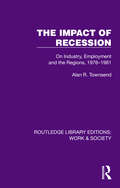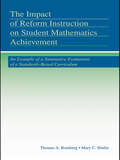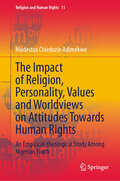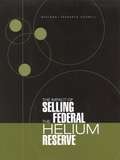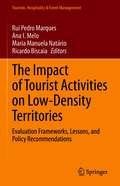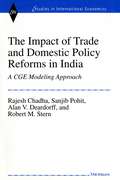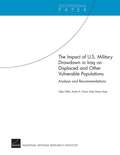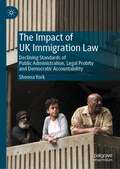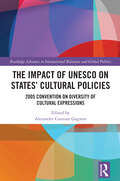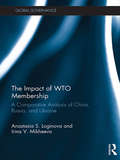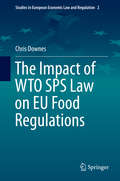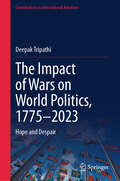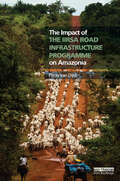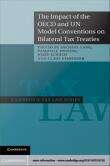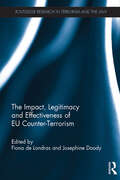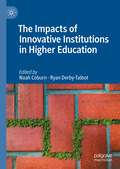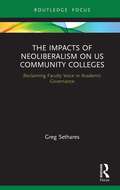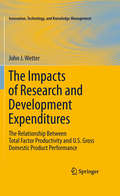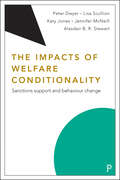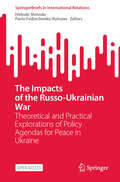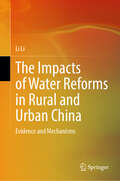- Table View
- List View
The Impact of Recession: On Industry, Employment and the Regions, 1976–1981 (Routledge Library Editions: Work & Society)
by Alan R. TownsendRich industrialised countries entered the 1980s with unemployment higher than before the Second World War. Britain experienced the impact of recession more immediately and sharply; over one million factory jobs were lost. Originally published in 1983 and now reissued with a new Preface by the author, this book points to the industries, corporations and places in which job losses occurred between 1976 and 1981. The Impact of Recession opens with an examination of national trends which includes the post-war rise and fall of manufacturing employment and the fashionable concept of ‘de-industrialisation’. It considers the possible and actual roles of leading industrial corporations in distributing decline to different areas. The effects of the crisis on individual regions is examined in detail and the author emphasizes that it is not only the traditional areas of recession such as the North East that were affected, but also the manufacturing centres of the Midlands and the normally prosperous South East. Alternative explanations of the distribution of employment are examined and the adequacy of previous explanations of unequal growth and decline are questioned. The book also looks at the extent to which New Towns have suffered in the crisis and whether the well-established consensus about the merits of regional planning has been broken down by the recession.
The Impact of Reform Instruction on Student Mathematics Achievement: An Example of a Summative Evaluation of a Standards-Based Curriculum (Studies in Mathematical Thinking and Learning Series)
by Thomas A. Romberg Mary C. ShaferSummarizing data derived from a four-year combined longitudinal/ cross-sectional comparative study of the implementation of one standards-based middle school curriculum program, Mathematics in Context, this book demonstrates the challenges of conducting comparative longitudinal research in the reality of school life. The study was designed to answer three questions: What is the impact on student performance of the Mathematics in Context instructional approach, which differs from most conventional mathematics texts in both content and expected pedagogy? How is this impact different from that of traditional instruction on student performance? What variables associated with classroom instruction account for variation in student performance? The researchers examined a range of variables that affected data collection. These variations highlight the need to study the effects of the culture in which student learning is situated when analyzing the impact of standards-based curricula on student achievement. This book is directed to educational researchers interested in curriculum implementation, mathematics educators interested in the effects of using reform curriculum materials in classrooms, evaluators and research methodologists interested in structural modeling and scaling of instructional variables, and educational policy makers concerned about reform efforts.
The Impact of Religion, Personality, Values and Worldviews on Attitudes Towards Human Rights: An Empirical-theological Study Among Nigerian Youth (Religion and Human Rights #11)
by Modestus Chiedozie AdimekweThis book provides a rigorous investigation into the adoption and culture of human rights in Nigeria, with a focus on the human rights attitudes of Nigerian students. Exploring the perceived paradox of enthusiastic endorsement of human rights instruments and their poor application in Nigeria, the author uses an empirical-theological research design to understand how young people in Nigeria evaluate human rights and which factors trigger their evaluation. In doing so, this book is the first to empirically examine the predictors of human rights attitudes among Nigerians and provides new insights into the degree of social significance of the religiosity of adolescents in the country. It also offers a compelling quantitative analysis differences in human rights attitudes among Nigerian youth along religious lines. Given the importance of a culture of human rights in our increasingly diverse societies and the salience of religion on this matter in Nigeria, and across the Africancontinent, this book provides a valuable perspective on the interrelationships between religion, value orientations, personality traits, socio-political context, and human rights. Being concerned with the future of human rights in Nigeria, the author argues that it is crucial to understand ‘the religious factor’ among Nigerian students today. This book is therefore recommended to educators, especially teachers of Religion Education, and scholars working in educational settings, but will also be of interest to researchers in social sciences, public administrators, and policymakers.
The Impact of Selling the Federal Helium Reserve
by Committee on the Impact of Selling the Federal Helium ReserveThe Helium Privatization Act of 1996 (P.L. 104-273) directs the Department of the Interior to begin liquidating the U.S. Federal Helium Reserve by 2005 in a manner consistent with ’minimum market disruption’ and at a price given by a formula specified in the act. It also mandates that the Department of the Interior ’enter into appropriate arrangements with the National Academy of Sciences to study and report on whether such disposal of helium reserves will have a substantial adverse effect on U.S. scientific, technical, biomedical, or national security interests.’ This report is the product of that mandate. To provide context, the committee has examined the helium market and the helium industry as a whole to determine how helium users would be affected under various scenarios for selling the reserve within the act’s constraints. The Federal Helium Reserve, the Bush Dome reservoir, and the Cliffside facility are mentioned throughout this report. It is important to recognize that they are distinct entities. The Federal Helium Reserve is federally owned crude helium gas that currently resides in the Bush Dome reservoir. The Cliffside facility includes the storage facility on the Bush Dome reservoir and the associated buildings pipeline.
The Impact of Tourist Activities on Low-Density Territories: Evaluation Frameworks, Lessons, and Policy Recommendations (Tourism, Hospitality & Event Management)
by Rui Pedro Marques Ana I. Melo Maria Manuela Natário Ricardo BiscaiaThis book tackles the question of how tourism development and suitable policies can be used to promote sustainable development in Low-Density Territories (LDTs). The respective chapters, written by prominent experts, identify the problems associated with LDTs; highlight the comparative advantages of these territories with regard to tourism; propose methodologies for assessing the impact of tourism; and present case studies on the application of sustainable policies in tourism. Given its scope, it will be especially interesting for academics and researchers investigating LDTs and sustainable tourism, and for policymakers interested in developing these territories. LDTs represent an economic challenge, especially because most of them are home to an increasingly ageing population unable to pursue economic development. In these territories, tourism is emerging as an excellent opportunity to promote innovative dynamics, to lure investment, and to attract new people. However, it is important to promote sustainable tourism, which preserves the environment and communities’ quality of life.The Chapter "Tourism, immigrants and lifestyle entrepreneurship: The (In)coming of people as a key factor for sustainability of low-density territories – A case study in Portugal" is available open access under a Creative Commons Attribution 4.0 International License via link.springer.com.
The Impact of Trade and Domestic Policy Reforms in India: A CGE Modeling Approach
by Robert M. Stern Alan V. Deardorff Rajesh Chadha Sanjib PohitMajor economic reforms undertaken since 1991 have brought the Indian economy into a new phase of development directed toward becoming globally competitive through the opening of trade, foreign investment, and technology inflows. The private sector is expected to play a lead role, with a corresponding reduction in the role played by the public sector. This book is aimed at analyzing the comparative static effects of selected post-1991 trade and domestic policy reforms on trade, factor prices, economic welfare, and the intersectoral allocation of resources. The study relies on a computable general equilibrium (CGE) model that has been specially designed to analyze the potential economic effects of India's policy reforms. The model was developed in a collaborative effort involving the National Council of Applied Economic Research in New Delhi and the University of Michigan. Patterned after the Michigan CGE Model of World Production and Trade that has been in use for more than two decades, the India CGE model features closer attention to special characteristics of India's economic structure, including more agricultural sector detail, allowance for state ownership, and administered pricing. The conclusions of the study suggest that the policy reforms will yield increased real returns to land, labor, and capital, and shift the terms of trade in favor of Indian agriculture. Lastly, not only are there efficiency-enhancing intersectoral shifts in resource allocation but there are notable increases in scale economies across the Indian manufacturing sectors.
The Impact of U.S. Military Drawdown in Iraq on Displaced and Other Vulnerable Populations
by Olga Oliker Dalia Dassa Kaye Audra K. GrantAs the United States continues to draw down its forces and prepares to end its military involvement in Iraq, the implications for Iraq's at-risk populations must be considered. Oliker, Grant, and Kaye assess the risks and implications of drawdown and withdrawal for some of the Iraqis in greatest danger, both within Iraq and in neighboring states. The authors conclude with recommendations on how the United States can mitigate identified problems.
The Impact of UK Immigration Law: Declining Standards of Public Administration, Legal Probity and Democratic Accountability
by Sheona YorkThis book provides an insightful analysis of recent developments in immigration, asylum and citizenship law in the broader social and political context. Written accessibly by an experienced practitioner, it critically examines the development of UK immigration control since the second world war, identifying and focusing on the grievous collateral damage being caused to the rule of law and to society. It examines the decline in standards of public administration, the secular failure to follow the rule of law, and the related issues of social corrosion and lack of democratic accountability. Speaking to academics, practitioners, policy makers and all those concerned about the impact of the hostile environment, it makes proposals for legal changes which prioritise social cohesion: a shared burden of proof, a simple regularisation scheme and clear path to citizenship, and details how these would operate in practice.
The Impact of UNESCO on States' Cultural Policies: 2005 Convention on Diversity of Cultural Expressions (ISSN)
by Alexandre Couture GagnonThe Impact of UNESCO on States' Cultural Policies focuses on the impact of the 2005 Convention on Diversity of Cultural Expressions on the cultural policies of eight states and substates, examining how they have integrated it into their own cultural policy.Cultural diversity presents a challenge for all governments. As migration increases and technology makes access to worldwide cultural products easier, governments seek to maintain a vibrant culture within their states or substates so that their populations can keep a strong sense of identity. Cultural policies become key to balance cultural diversity and national identity, or to promote them in parallel. The book addresses three main themes: how governments deal with cultural diversity, especially in their cultural policies; what the impact of an international convention on individual states’ policies is; and how different states’ status (i.e. size) on the international scene affects their implementation of an international convention.Providing a systematic comparative analysis, this book will be of great interest to students and scholars of public policy, cultural policy and international organizations. It will also be useful to policymakers involved in cultural policy.
The Impact of WTO Membership: A Comparative Analysis of China, Russia, and Ukraine (Global Governance)
by Anastasia S. Loginova Irina V. MikheevaWhat lessons can be learnt from the accession to the World Trade Organization (WTO) of Russia, China, and Ukraine? Were there any peculiarities in the adaptation of their economies to the rules and norms of the organisation, and what impact did it have on the world trade system? This detailed, systematic, and comparative analysis of the social and economic impact of the accession of these countries to the WTO addresses these questions, presenting an economic and legal analysis of the reasons and consequences of their joining the WTO. Comparative legal and economic methods are used to explore the social and economic causes and consequences of membership for post-communist states and to suggest ways in which new members can adapt to WTO standards. This work will be of interest to experts and students in the fields of economics, jurisprudence, and customs affairs.
The Impact of WTO SPS Law on EU Food Regulations
by Chris DownesThis book brings a fresh perspective on the emerging field of international food law with the first detailed analysis of the process and implications of domestic compliance with the World Trade Organisation (WTO) Sanitary and Phytosanitary (SPS) Agreement. It investigates the influence of WTO disciplines on the domestic policy-making process and examines the extent to which international trade law determines European Union (EU) food regulations. Following controversial WTO rulings on genetically-modified foods and growth hormones in beef, awareness and criticism of global rules governing food has grown considerably. Yet the real impact of this international legal meta-framework on domestic regulations has remained obscure to practitioners and largely unexplored by legal commentators. This book examines the emergence of transnational governance practices set in motion by the SPS Agreement and their role in facilitating agricultural trade. In so doing, it complements and challenges conventional accounts of the SPS regime dominated by analysis of WTO disputes. It reviews legal commentary of the SPS Agreement to understand why WTO rules are so commonly characterised as a significant threat to domestic food policy preferences. It then takes on these assumptions through an in-depth review of food policies and decision-making practices in the EU, revealing both the potential and limits of WTO law to shape EU policies. It finally examines two important venues for the generation of global food norms - the WTO SPS Committee and Codex Alimentarius - to evaluate the practice and significance of transnational governance in this domain. Through detailed case studies including novel foods, food additives, vitamin and mineral supplements and transparency and equivalence procedures, this book provides a richer account of compliance and exposes the subtle, but important influence of WTO obligations.
The Impact of Wars on World Politics, 1775–2023: Hope and Despair (Contributions to International Relations)
by Deepak TripathiIn a study of cyclical history, this book presents a grand sweep of modern history and how decades of savage wars, and turbulence, led to a brief era of exhilaration and hope, followed by despair in the new century. The collapse of the Berlin Wall (1989) and the Soviet Union (1991), marking the end of the Cold War, were celebrated with great euphoria. The book points out that the defeat of Soviet communism by the Western allies was one of the most consequential outcomes of great power conflict in the twentieth century, comparable to the defeat of fascism in the Second World War, and of the Central Powers led by Germany and Austria-Hungary in the First World War. However, optimistic predictions of a peaceful and orderly world after the Cold War proved wrong, and new challenges emerged across the globe such as international and regional conflicts, climate change, and mass migration. The book explains how the initial excitement and hope after the collapse of the Soviet Union turned to new challenges, and despair, continuing the cycle of history. Tripathi's scholarly rigor, combined with his journalistic clarity, makes this book a landmark publication that stands out for its depth, relevance, and the urgent message it conveys about the necessity of learning from history to navigate the challenges of the future. Ashok Swain, Professor & Head, Department of Peace and Conflict Research, Uppsala University This book is a strong, well-written, and explorative testimony of war and conflict, their roots and dynamics, as well as consequences and impact on politics and human lives. Nora Sveaass, Professor Emeritus, Department of Psychology, University of Oslo
The Impact of the ECHR on Democratic Change in Central and Eastern Europe
by Motoc, Iulia and Ziemele, Ineta Iulia Motoc Ineta ZiemeleHigh hopes were placed in the ability of the European Convention and the Court of Human Rights to help realise fundamental freedoms and civil and political rights in the post-communist countries. This book explores the effects of the Strasbourg human rights system on the domestic law, politics and reality of the new member States. With contributions by past and present judges of the European Court of Human Rights and assorted constitutional courts, this book provides an insider view of the relationship between Central and Eastern European states and the ECHR, and examines the fundamental role played by the ECHR in the process of democratisation, particularly the areas of the right to liberty, the right to propriety, freedom of expression, and minorities' rights.
The Impact of the European Community's Internal Market on the EFTA
by Richard K. Abrams Peter K. Cornelius Per L. Hedfors Gunnar TersmanA report from the International Monetary Fund.
The Impact of the Freedom of Information Act on Central Government in the UK
by Robert Hazell Ben Worthy Mark GloverBased on interviews with officials, requesters and journalists, as well as a survey of FOI requesters and a study of stories in the national media, this book offers a unique insight into how the Freedom of Information Act 2000 really works.
The Impact of the IIRSA Road Infrastructure Programme on Amazonia
by Pitou van DijckThis book analyses the potential socio-economic and environmental impacts of the Initiative for Regional Infrastructure Integration in South America (IIRSA), a continent-wide programme. IIRSA aims at facilitating intra-regional trade and at improving trade and transport links with world markets. This is the first book on IIRSA and its potential implications for South America and more specifically for Amazonia. The book provides an in-depth analysis of the infrastructure programme and deals particularly with methods to assess the probable effects of road construction in environmentally fragile territories. To deepen our understanding of the potential impacts of roads in these areas, the book combines insights from economic and environmental sciences and gives a critical review of traditional assessments and strategic environmental assessments (SEAs). A comprehensive approach of assessing impacts is presented in three case studies of SEAs: the Corredor Norte in Bolivia, the road between Manaus and Porto Velho in Brazil, and the proposed road to link Suriname with Brazil.
The Impact of the OECD and UN Model Conventions on Bilateral Tax Treaties
by Michael Lang Michael Lang Pasquale Pistone Josef Schuch Claus Staringer Pasquale Pistone Josef SchuchThis book provides an analysis of bilateral tax treaties concluded by thirty-seven jurisdictions from five continents and empirically ascertains the impact of the UN and OECD Model Tax Conventions on bilateral tax treaties. It therefore fills a major gap in the international tax literature, which has so far either studied the sole Model Tax Conventions or focused on bilateral treaties in the context of the tax treaty policy of single countries, and sets the pace for a new methodology in the analysis and interpretation of tax treaties. A general report outlines the key points of the analysis, highlights current trends and predicts future developments of multilateralism and global tax law. This is an essential resource for academics, tax authorities and international tax practitioners who find textbooks based on Model Tax Conventions insufficient.
The Impact, Legitimacy and Effectiveness of EU Counter-Terrorism (Routledge Research in Terrorism and the Law)
by Fiona de Londras and Josephine DoodyCounter-terrorism law and policy has been prominent and widespread in the years following 9/11, touching on many areas of everyday life from policing and border control to financial transactions and internet governance. The European Union is a major actor in contemporary counter-terrorism, including through its development of counter-terrorism laws for application within the Union. This book undertakes a multi-disciplinary and empirically informed analysis of the impact, legitimacy and effectiveness of EU counter-terrorism. Taking into account legal, societal, operational and democratic perspectives, this collection connects theoretical and practical perspectives to produce an interdisciplinary and multi-stakeholder study of how we might measure and understand the impact, legitimacy and effectiveness of EU counter-terrorism. Bringing together a select group of experts in the field, particular emphasis is placed on understanding the practical experience of implementing and assessing these measures gathered from and with end users, including law-makers, policy-makers, security services, industry partners and civil society. This edited collection will be of great relevance to scholars and policy makers with an interest in counter-terrorism law, EU law and security studies.
The Impacts of Innovative Institutions in Higher Education
by Noah Coburn Ryan Derby-TalbotAs they have done historically, innovative institutions enrich the college ecosystem, helping the higher educational industry develop flexible resilience. The chapters in this book showcase perspectives, hard-won lessons, challenges and provocative ideas about how historically innovative institutions can contribute to the current discourse on innovation in higher education. The chapters in this book include case studies of innovative campuses and practices, as well as future-looking directions for innovation. Taken together, they ask, is there a way to consider how future trends can be navigated in effective ways, so that the most important features of higher education––student learning, the liberal arts, the cultivation of critical thinking––can remain central to tomorrow’s institutions?
The Impacts of NAFTA on North America
by Imtiaz HussainWhy was NAFTA not extended, even after fulfilling several stated objectives? Investigating a number of roadblocks and utilizing James Rosenau's state-multi-centric models, the book's conclusions shed light not just on why North American integration is not working, but on broader regional experiments.
The Impacts of Neoliberalism on US Community Colleges: Reclaiming Faculty Voice in Academic Governance (Routledge Studies in Education, Neoliberalism, and Marxism)
by Greg SetharesFocusing on community colleges as a unique structure within American higher education, this text investigates the specific ways in which these institutions have been impacted by a global increase in neoliberal education policies. Analyzing the effects neoliberalism has had on community colleges, the text charters discourse relating the erosion of faculty voice in academic governance, and decision making; the vocationalization of curriculum; and the impact that these factors have had on the ability of community colleges to provide students with an education that supports a democratic society. Exposing a movement away from the historical aims of community-based education, the text evidences a hijacking of community colleges to serve the objectives of the corporate elite. There has been a decline in community college faculty engagement in shared governance and their loss of recognition as academic and curricular leaders, and the book discusses the potential for redistribution of decision-making power back toward faculty. This text will be of great interest to graduate and postgraduate students, academics, professionals and policy-makers in the fields of Higher Education, Education Policy and Politics, Sociology of Education, Higher Education Management and Education Politics.
The Impacts of Research and Development Expenditures
by John J. WetterThe research underlying this volume was designed to test the theory of Total Factor Productivity (TFP) in contemporary context. Developed by Nobel Prize-winning economist, Robert Solow, in the 1950s, TFP has been applied by many economists to investigate the relationships among capital, labor, and economic performance. In this analysis, John Wetter presents the hypothesis that technological investment drives growth and performance of the U.S. economy. The study addresses four key questions: 1. Is there a relationship between Total Factor Productivity and Gross National Product? 2. Is there a relationship between Total Factor Productivity and Research & Development expenditures? 3. Is there a relationship between Research & Development expenditures and Gross Domestic Product? 4. Can the relationship in research question #1 be explained by other factors? Is there any potential non-spuriousness (mediation) implication to the relationship? Synthesizing the literature from related fields, including macroeconomics, technology transfer, and innovation, and applying rigorous methodology, Wetter demonstrates that Total Factor Productivity is positively related to Gross Domestic Product and is mediated by Research & Development. In addition, he reveals that the lag time between R&D spending and GDP growth averages eleven years, which suggests that long-term planning is essential to maximizing the benefits of R&D. Wetter considers the implications for policymaking and industry leadership, including such timely issues as the effects of the 2009 U.S. stimulus program.
The Impacts of Welfare Conditionality: Sanctions Support and Behaviour Change (Welfare Conditionality)
by Peter Dwyer Lisa Scullion Katy Jones Jenny McNeill Alasdair B.R. StewartShould a citizen’s right to social welfare be contingent on their personal behaviour? Welfare conditionality, linking citizens’ eligibility for social benefits and services to prescribed compulsory responsibilities or behaviours, has become a key component of welfare reform in many nations. This book uses qualitative longitudinal data, from repeat interviews with people subject to compulsion and sanction in their everyday lives, to analyse the effectiveness and ethicality of welfare conditionality in promoting and sustaining behaviour change in the UK. Given the negative outcomes that welfare conditionality routinely triggers, this book calls for the abandonment of these sanctions and reiterates the importance of genuinely supportive policies that promote social security and wider equality.
The Impacts of the Russo-Ukrainian War: Theoretical and Practical Explorations of Policy Agendas for Peace in Ukraine (SpringerBriefs in International Relations)
by Hideaki Shinoda Pavlo Fedorchenko-KutuyevThis open access book discusses conditions of conflict resolution over the Russo-Ukrainian War and analyzes requirements for long-term durable peace for Ukraine. What are the impacts of the Russo-Ukrainian War? Do we really know them? The authors examine this question from various perspective including conflict resolution theories, international relations theories, geopolitical theories, domestic and regional politics, regional security system, public opinion and national identity of Ukraine, etc. In so doing, the authors identify the war as a complex crux of many theoretical and practical issues like the merger of the Donbas War from 2014 with the full-scale invasion by Russia in Ukraine as a typical example of “internationalized internal-wars”. The authors also seek to develop their findings to ask a question, what are the agendas for durable peace for Ukraine? The authors argue that the agendas should include ripeness theory, security guarantees, deterrence mechanisms, geopolitical arrangements, domestic national identity formation, etc. The authors do not necessarily address the question about the way the war can be terminated, while the mode of the termination is within the scope of their investigation. In any case, however, the authors seek to highlight the basic framework for durable peace in Ukraine.
The Impacts of Water Reforms in Rural and Urban China: Evidence and Mechanisms
by Li LiThis book provides a comprehensive examination of three key water reforms in China. By leveraging unique natural experiments and employing state-of-the-art applied microeconometric methods, this book offers robust insights into the causal links between water reforms and economic outcomes in China. The book covers three major reforms: the rural drinking water program, private sector participation in urban water supply, and the adoption of Increasing Block Tariffs (IBTs) in the urban domestic water sector. It highlights how these reforms have shaped rural children's human capital development, urban water utilities' performance, and urban residents' water demand. Designed for academics, researchers, and graduate students in economics, environmental policy, and public administration, this book also appeals to policymakers, water sector professionals, and development agencies in developing countries. The content is scholarly and research-oriented, providing valuable insights into water reform policies.
